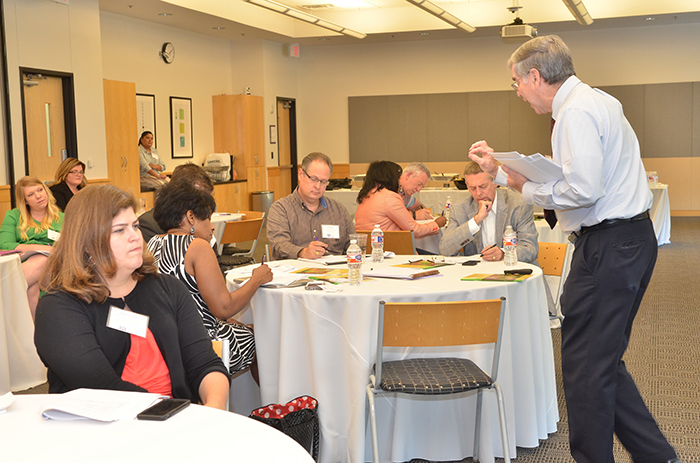Neeley makes sure your education doesn’t stop after you graduate. At the recent “How Do I Find My Zone?” workshop, we focused on improving ourselves.
June 22, 2016
Neeley makes sure your education doesn’t stop after you graduate. At the recent “How Do I Find My Zone?” workshop, we focused on improving ourselves.

If you’re going to lead people, you have to understand what makes them tick.
You also have to understand what makes you tick – what’s going on inside you, emotionally.
It’s called Emotional Intelligence, or EQ, and it’s what Dr. Richard “Nick” Grant talked about in the second part of his workshop for Executive MBA students and alumni.
It was one of those days that reminded the graduates what it was like to be in class here at Neeley – the little gasps, the eyes lighting up, the furious note-taking as suddenly some of life’s mysteries started making sense. A lot of sense.
First we got a refresher on the Meyers-Briggs Type Indicator we all took at the In-Residence Seminar (which we’ll cover in part 3 of this series), but Dr. Grant was soon taking us back in time to discover why we feel certain things and react in certain ways.
Here are some of the most fascinating things we learned.
Don’t inflict your early family experiences on your company.
As a child, you probably tried various behaviors and watched how your parents reacted to them. Their reactions shaped how you view relationships, and are still shaping your behavior now – even at work.
For instance, if you had a critical parent, you may tend to be critical of your subordinates. If money was tight and your parents usually said “no” when you asked for something, you might find it hard to ask your boss for resources you need.
Dr. Grant prompted us to think about how we experienced various things in our early family lives, how we might be transferring those views to the workplace, and how we can improve. Here are a few of those topics:
- Problem-solving
- Meetings
- Feedback/critique
- Asking for what you want
- Collaboration/teamwork
- Celebrating success
- Handling change
You can have emotional reactions to things that happened before you were born.
Have you ever surprised yourself by overreacting to something minor? You may have been transferring unconscious feelings you picked up from previous generations. We inadvertently copy attitudes expressed by our parents, who copied their parents. So if something major happened to a previous generation (like the Great Depression), then a smaller, but similar event (like the recent recession) could trigger an extreme, Depression-sized emotion in later generations.
Typically, our own feelings are moderate and bearable, whereas inherited emotions are extreme. If you experience despair, rage or paranoia instead of simply sadness, anger or caution, you may be dealing with inherited emotions.
Once you know where these emotions are coming from, they lose some of their power over you. Dr. Grant had us fill out a quick family tree to map out major events and attitudes affecting our parents, grandparents, aunts and uncles. He also asked us to think about the jokes or stories told, or the comments made (which is often how bigotry and bias are spread). Ask yourself about your family members’ attitudes toward:
- Genders
- Religions
- Ethnic groups
- Situations
If you want to help your kids, work on your own stuff.
Just as you inherit attitudes from your parents, your kids will inherit attitudes from you. Kids pick up on your unconscious tension, and may act out the things you fear, but are not dealing with. Once you’ve dealt with your own issue, you’ll stop subconsciously behaving in ways that negatively affect your child’s behavior.
Dr. Grant told a story about a couple that called him about their 5-year-old son who was suddenly acting out. He asked them each what their lives were like at age 5. The father remembered that was when his father had lost his job and started drinking. Just by realizing that and talking about it, the couple saw their child’s behavior return to normal.
Sexual attraction can be a roadmap for personal development.
Dr. Grant laid out a scenario for us featuring a happily married man who suddenly starts noticing another woman. She may be a complete stranger he saw at the barber’s, or she may be someone he works with, but he finds himself feeling things for her, and he starts to panic. Is he a bad person? Is there something wrong with his marriage?
Relax, advises Dr. Grant. This woman simply represents a roadmap for your personal development. He tells patients who experience this phenomenon to write down which qualities in the woman they find so attractive. Is it her energy, attitude, assertiveness? Is it that she is fit, talented, polished? Write all these qualities down. Now forget about the woman. Just look at the list. This is the list of things you wish you were. Work on that.
While men in their middle age tend to transfer their personal desires onto a woman, woman can transfer those desires onto anything in their lives – a job, a hobby, a cause.
Take care of your “kid.”
While Dr. Grant never actually said the words “inner child,” he did share some related advice: Take care of your own emotional issues as you would a child’s. When you deal with what’s going on inside you, you don’t take things out on your family or your coworkers.
Dr. Grant suggested talking to your “kid” as you drive home from work. (“Maybe not a good idea if you take the bus,” he joked.) Some people even pretend to buckle in the kid if it helps the mental image. Then you talk to your kid about their day, what they liked and didn’t like about it, what they need to do to deal with the emotions. Do they need to take some action tomorrow? Do they just need a good rest tonight? Talk it out.
Somehow, telling your imagined child-self, “I’ve got your back,” is more powerful than looking in the mirror and saying “I’m good enough.” For instance, if you need to learn to be more assertive, imagine you are defending the child, instead of just speaking for yourself. Powerful parent instincts kick in.
Find your relationship baseline.
Sometimes we don’t like the way we’re being treated, but it’s hard to pinpoint what, specifically, we don’t like.
Just like when we talked about finding our zone, it’s important to focus on the positive, not the negative. Dr. Grant introduced another useful exercise:
- Write down the names of people who, now or in the past, liked you for who you were – not because you were smart or good looking, but just liked you for “you.”
- Write down how those people treated you. What did they do that showed you they liked you?
- You now have the secret recipe for how you most want to be treated.
Dr. Grant mentioned this is a great activity to do with your spouse. You can each talk about one of the people on your list over dinner each evening (the rule is you can’t write your spouse on the list), to build an understanding of how your spouse wants to be treated.
You can also use it with your subordinates at work. If someone on your team just doesn’t like you, try asking them about a boss they did like – and how that person treated them.
All of these exercises can help you discover ways to become a better leader, spouse or parent. Try them out – and stay tuned for the final recaps from the workshop, on Coaching by Personality Type.
Want Dr. Grant to teach your team how to improve everything from your leadership to your sales meetings through psychology? Contact him here.

